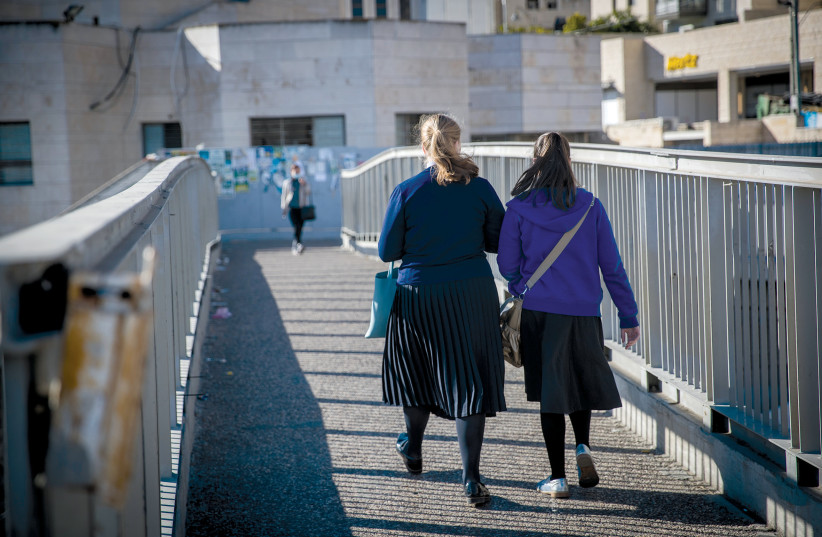The gaps in the Israeli education system have widened and continue to be among the highest in the world, as indicated by the results of the international PISA test published today (Tuesday). The results, released by the National Authority for Measurement and Evaluation in Education (RAMA), are from the PISA test conducted last year, postponed from 2021 due to the COVID-19 pandemic. This provides a snapshot of the Israeli education system as it emerges from the pandemic. According to the test, haredi girls lead the achievements of girls in Israel in mathematics and reading.
The PISA test is a comprehensive international study assessing the literacy level of 15-year-old students in various countries. Conducted every three years since 2000 by the OECD, it significantly influences educational agendas in subsequent years.
In the 2022 PISA study, whose results were revealed today, about 625,000 students from 81 countries and economic entities participated. In Israel, the study was conducted among approximately 6,250 students from 193 schools, representing a national sample.
The current test data presents three key findings. The first is stability in the achievements of Israeli students compared to declines in OECD countries, with improvement in Israel's relative position, especially in reading, where achievements are now close to average.
The second is a sharp decline in the achievements of girls in state-religious education, contrasted by a surprising result from haredi female students, who lead in Israel in mathematics and reading achievements.

The third finding, relating to language sectors, shows very high gaps between Hebrew and Arabic speakers, particularly in reading; alongside a weakening of Hebrew speakers in mathematics and a slight strengthening of Arabic speakers in science.
A central and somber conclusion from the test results is the worrying expansion of gaps against a socio-economic-cultural backdrop in the Israeli education system. In all three literacy areas tested in PISA - mathematics, science, and reading - there was an increase in the achievements of students from a relatively established background, while there was a decline among students from a socio-economically defined as average or low, especially in mathematics.
However, in the science and reading areas, students from a socio-economically average or low background maintained stability compared to the previous test in 2018. The gaps in mathematics scores between students from different socio-economic backgrounds widened by 20 points, and in science and reading scores - by 10 points in each subject. As a result, the gap between students from different socio-economic backgrounds now stands at about 120 points in mathematics and reading and about 115 points in science.
The test results place Israel unfavorably in the inequality index in achievements, reflecting the gap between the threshold score of the top decile and the bottom decile. Israel stands out negatively in achievement inequality: in each of the three literacy areas, the achievement gap in Israel is much larger than the average gap in OECD countries. Among all the countries participating in the 2022 test, Israel's achievement gap is the second largest in reading and the third largest in mathematics and science.
A 5-year educational gap between sectors
According to the research results, the gaps between Hebrew and Arabic speakers have slightly narrowed, but they are still very large; there is a gap of about 100 points in mathematics and science scores and 136 points in reading scores.
Recent studies and the OECD report suggest that a 20-point score gap reflects the knowledge acquired in one year of schooling. According to this metric, there is a five-year educational gap between Arabs and Jews. The relative narrowing of the gap this year is partly due to a 12-point decrease in the achievements of Hebrew-speaking students in mathematics, and an 11-point increase (not statistically significant) in the achievements of Arabic-speaking students in science.
However, about two-thirds of Arabic-speaking students struggled in each of the examined areas - a rate more than twice the average of struggling students in OECD countries. According to the data, the rate of excellence among Arabic speakers in all literacy areas is negligible. There was an increase in achievements among Arabic speakers in science and a decline among Hebrew speakers in mathematics.
The gaps are also higher than average among the Hebrew speakers themselves, in all types of school supervision: state, state-religious, and haredi (ultra-orthodox). Another finding from the research is that the gaps in state-religious education are larger than those in state education; among Hebrew speakers, achievement gaps in schools under state-religious supervision are greater than those under state supervision (by 25-35 points).
When examining the data from a gender perspective, there are declines in the average achievements of girls in Israel - particularly in mathematics, where there was a decline of 15 points compared to the previous test in 2018.
The declines are especially noticeable among girls in state-religious education (a decline of about 25 points in all three areas), and the declines in haredi education are moderate. In light of these changes, haredi girls lead the achievements of girls in Israel in mathematics and reading: in mathematics, their achievements are similar to those of girls in state education, and in reading, they are higher by 12 points. In science, the achievements of haredi girls are higher by 9 points than those of girls in state-religious education.
